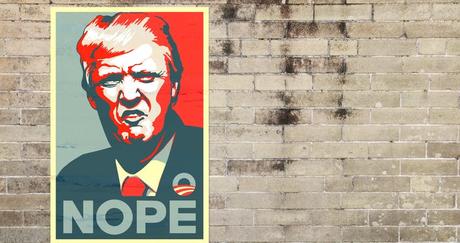 President Trump recently stated his support for ‘Judeo-Christian values’ … but what does that phrase really mean? (Pixabay, CC BY-SA) By M J C Warren, University of Sheffield
President Trump recently stated his support for ‘Judeo-Christian values’ … but what does that phrase really mean? (Pixabay, CC BY-SA) By M J C Warren, University of SheffieldThe phrase “Judeo-Christian” has been around since the 1930s but US President Donald Trump recently resurrected it in a deeply problematic speech on October 13, 2017 in which he said: “We are stopping cold the attacks on Judeo-Christian values … We’re saying ‘Merry Christmas’ again.”
Christian-majority nations such as the UK and US often lay claim to laws and ethics based on “Judeo-Christian values”. But it is important to remember that Jews have been systematically excluded from and terrorised by states that claim this Judeo-Christian foundation.
From the 1290 expulsion of Jews from England to Jewish refugees being turned away by Canada, the US and the UK during World War II, Jews have been excluded more often than welcomed.
For centuries, Jews have been made to feel unwelcome in the Christian world and it seems that it is only now that a new demographic of (often Muslim) immigrants fleeing war and economic hardship have reached the West that Jews are being included – and even then only on someone else’s terms.
A right wing slogan
“Judeo-Christian” is now most often used to draw a line between imagined Christian values and a perceived (but false) threat of Muslim immigration. It’s in this context, that right wing figures such as Nigel Farage use the phrase. Talking about radical Muslim clerics such as Anjem Choudary, he said for example:My country is a Judeo-Christian country. So we’ve got to actually start standing up for our values.But in this statement, Farage connects his fears of radical Islam with the idea of “Judeo-Christian values”. It appears that it isn’t so much about including Jews as it is about excluding Muslims. And since Farage has also come under attack for anti-Semitic comments, including being called on to apologise after recent comments about the threat of “the Jewish lobby” to American politics, it seems hard to view the “Judeo-” in his “Judeo-Christian” as actually valuing Jewish people or Judaism as a religion.
Time and again, when Farage and Trump use the term, what they really imply is an “us-versus-them” division between the West and Islam. This is not about the inclusion of Jews in the values of these nations, then, but about the xenophobic exclusion of an “other”.
Invoked in anti-immigration rhetoric with the goal of excluding Muslims, this phrase is actually used to scaffold a false narrative about Christians being persecuted, threatened or besieged, which gives motivation for the protection of “Judeo-Christian values”. In fact, Christians are not persecuted in the countries where Farage and Trump make their homes.
Supersessionism
A quick search on Twitter for the phrase “Judeo-Christian” illustrates that white supremacists have embraced the term – and that Jews reject it.It’s not surprising that many Jews are not falling for this dog-whistle phrase, especially since the myth of a Judeo-Christian society rests on the false – and dangerous – idea that Judaism and Christianity hold the same ideas and values.
There are many fundamental differences between these two religions – and that’s OK. To respect and value Judaism means to do so on its own terms, and not only if it conforms to Christian ideas about what religion should be. Ignoring these differences (and to pretend that Jews and Christians believe the same things) risks subsuming Judaism into Christianity. It risks viewing Judaism as an archaic precursor to Christianity rather than a continuing unique and vibrant tradition. There is nothing “Judeo” about saying Merry Christmas.
Indeed, the phrase “Judeo-Christian” erases Judaism by implying that Christian values are Jewish values. Erasing Judaism by subsuming it into Christianity is called supersessionism, a tactic of Christian polemicists for centuries, and one that is currently in use by the Christian religious right.
![]() It seems, then, that the idea of Judeo-Christian values excludes both Jews and Muslims. The phrase tacitly excludes Jews by subsuming Judaism into Christianity, and it explicitly excludes Muslims in its use in anti-immigration rhetoric. In reality, “Judeo-Christian values” actually point to a particular type of right-wing Christian values. Continuing to use this phrase only contributes to exclusionary and divisive political rhetoric. When we hear it, we should call it out for what it is.
It seems, then, that the idea of Judeo-Christian values excludes both Jews and Muslims. The phrase tacitly excludes Jews by subsuming Judaism into Christianity, and it explicitly excludes Muslims in its use in anti-immigration rhetoric. In reality, “Judeo-Christian values” actually point to a particular type of right-wing Christian values. Continuing to use this phrase only contributes to exclusionary and divisive political rhetoric. When we hear it, we should call it out for what it is.
About Today's Contributor:
M J C Warren, Lecturer in Biblical and Religious Studies, University of SheffieldThis article was originally published on The Conversation.

